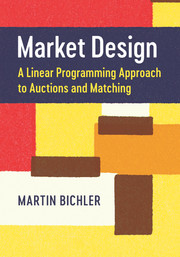3 - Mechanism Design
from Part I - Microeconomic Fundamentals
Published online by Cambridge University Press: 08 December 2017
Summary
Mechanism design studies the construction of economic mechanisms in the presence of rational agents with private information. It is sometimes called reverse game theory, as mechanism designers search for mechanisms which satisfy game-theoretical solution concepts and achieve good outcomes. For example, an auctioneer might want to design an auction mechanism which maximizes social welfare of the participants and exhibits dominant strategies for bidders to reveal their true valuations. We mostly discuss market mechanisms in this book, but mechanism design is not restricted to markets and the basic principles can be applied to various types of interactive decision making.
Mechanism design has relations to social choice theory, which is a field in economics focusing on the aggregation of individual preferences to reach a collective decision or social welfare. Social choice theory depends upon the ability to aggregate individual preferences into a combined social welfare function. Therefore, individual preferences are modeled in terms of a utility function. The ability to sum the utility functions of different individuals, as is done in auction theory in chapter 4, depends on the utility functions being comparable with each other; informally, individuals’ preferences must be measured with the same yardstick. The mechanism design literature on auctions typically assumes cardinal utility functions and interpersonal utility comparisons, as in the early social choice literature such as Bergson (1938) and Samuelson (1948). Note that Arrow (1950) and much of the subsequent literature assumes only ordinal preferences and rejects the idea of interpersonal utility comparisons. This means that utility cannot be measured and compared across individuals. The auction design literature as discussed in this book is an exception and assumes quasi-linear utility functions, where bidders have cardinal values for an allocation and maximize their payoff on the basis of prices in the market. Also, utility is comparable across agents. Cardinal preferences allow agents to express intensities, which is not possible with ordinal preferences only. For example, an agent might much prefer a diamond to a rock, but this information about intensity will be ignored if only ordinal preferences (diamond ≻ rock) are expressed.
Information
- Type
- Chapter
- Information
- Market DesignA Linear Programming Approach to Auctions and Matching, pp. 30 - 52Publisher: Cambridge University PressPrint publication year: 2017
